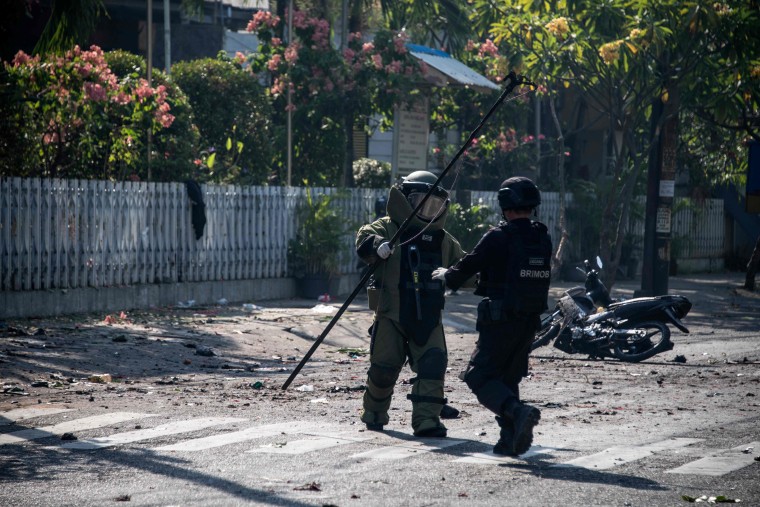JAKARTA — Suicide bombers who carried out deadly attacks on three churches in Indonesia's second-largest city on Sunday were a family of six that included two young children, police said, as the world's most populous Muslim nation recoiled in horror at one of the worst attacks on its Christian minority.
At least seven people plus the six bombers died in the attacks in Surabaya, according to police. At least 41 people were injured in the attacks, which Indonesia's president condemned as "barbaric."
The bombings were the worst to target churches in Indonesia since a series of attacks on Christmas Eve in 2000 killed 15 people and wounded nearly 100. Religious minorities in Indonesia, especially Christians, have been repeatedly targeted by militants.
National police chief Tito Karnavian said that the father exploded a car bomb, two sons aged 18 and 16 used a motorcycle for their attack, and the mother was with daughters aged 12 and 9 for her attack.
Karnavian said the family had returned to Indonesia from Syria, where until recently the Islamic State group controlled significant territory.
Karnavian identified the father as Dita Futrianto and said he was head of the Surabaya cell of Jemaah Anshorut Daulah, an Indonesian militant network affiliated with ISIS that has been implicated in attacks in Indonesia in the past year. He identified the mother as Puji Kuswati.
The extremist group claimed responsibility for Sunday's attacks in a statement carried by its Aamaq news agency. It didn't mention anything about families or children taking part in the attack, and said there were only three attackers. NBC News could not verify the claim.
The first attack struck the Santa Maria Roman Catholic Church in Surabaya, police spokesman Frans Barung Mangera told reporters at the scene. That blast was followed by a second explosion minutes later at the Christian Church of Diponegoro and a third at the city's Pantekosta Church, Mangera said.
Shattered glass and chunks of concrete littered the entrance of the Santa Maria Church, which was sealed off by armed police. Rescue personnel treated victims at a nearby field while officers inspected wrecked motorcycles in the parking lot that had been burned in the explosion.
In Jakarta, Indonesia's capital, the Indonesian Church Association condemned the attacks.
"We are angry," said Gormar Gultom, an official with the association, but urged people to let the police investigation take its course.
Indonesia's two largest Muslim organizations, Nahdlatul Ulama and Muhammadiyah, also condemned the attacks.
The bombings were the worst since a series of attacks on churches on Christmas Eve in 2000 killed 15 people and wounded nearly 100. Religious minorities, especially Christians, have been repeatedly targeted by militants.
The latest attacks in predominantly Muslim Indonesia came days after police ended a riot and hostage-taking at a detention center near Jakarta that left six officers and three inmates dead. The Islamic State group has claimed responsibility.
Indonesia has carried out a sustained crackdown on militants since bombings by al-Qaida-affiliated radicals in Bali in 2002 killed 202 people. In recent years, the country has faced a new threat as the rise of the Islamic State group in the Middle East invigorated local militant networks.
Christians, many of whom from the ethnic Chinese minority, make up about 9 percent of Indonesia's 260 million people.
